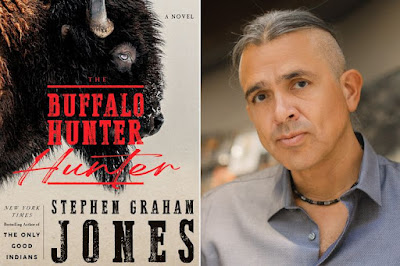America’s Worst Dream: The Buffalo Hunter Hunter by Stephen Graham Jones
When a journal is discovered in the walls of an old church, Etsy Beaucarne sees a way to end her tenure woes for which she works. It’s the journal of one of her many-great grandfathers, Arthur Beaucarne, who writes of tending his flock as a pastor in a the small town of Miles City during the year of 1912 and his conversations with a curious Indian who attends his services. The doors that are opened for Arthur, and for Etsy, are not the ones that they expect and will lead both down a path of wonder and blood, of treachery and loss, of violence and pain that characterized the dealings of the white settlers and their Native American counterparts.
Welcome to The Buffalo Hunter Hunter by Stephen Graham Jones.
 |
| Nabbed from People.com’s review of the book, with Stephen Graham Jones |
I know if you were to look back at my history of book reviews, you will find a significant number of them are by Jones. If you are wondering why that is the case, it’s because I have completely fallen in love with his use of prose, his vivid imagery, and his unwavering ability to address issues that make the average white man cringe and scream that HE didn’t have anything to do with it, all while idolizing the imagery of the Wild West with its cowboy boots, guns, and vigilante justice.
This book takes all of his artful abilities and ramps them up to an 11. Each chapter I read, each shift in perspective between Arthur and Good Stab (which takes up the bulk of the novel) led me further and further into the supernatural. Arthur’s descriptions of the Indian in the midst of his congregation and in his town was horrifying in how normal the racism seemed. The words might have fit the group, but it was the same casual and disarming racism that almost makes you do a double take to see if, yes, they really did just say that.
Good Stab fascinated me as a character who has been thrust into a genre of horror that has predominately featured white protagonists. Even in Twilight, the vampires are all European/Caucasian, while the Native Americans are given a “bestial” nature of the werewolf (and wow, does that hit differently after reading this book, even though it never made me comfortable to begin with). (Also, I only read that series so that I could make fun of it, back when I felt like I had to torture myself with books I hated in order to have an opinion on them. Please don’t do this to yourself, not unless you really, really are a masochist.) Good Stab’s experience shows just how little value the life of a Native American had in the burgeoning new country dominated by the white people.
Jones actually talks about this - how Good Stab’s people begin to adapt to the new things that the white people bring and how they begin to crave them. His story is just one among many peoples who have seen themselves conquered, one of a culture slowly being erased by others who don’t understand it, but it doesn’t make it any less poignant.
There is a quote that hit me especially hard:
“You can’t stop a country from happening, Good Stab.”
“But we were already a nation,” he said up to me. “We didn’t ask you to come.”
I don’t think I need to add anything else to explain why that hit me so hard.
Once again, Stephen Graham Jones has given us a tremendous gift - the gift of perspective. If we don’t learn from history, we are doomed to repeat it. History isn’t comfortable. It isn’t nice. The history of this country, and many others, is written in pain and blood, and as a person of a certain pallid skin tone, we shouldn’t shy away from it. It is MEANT to make us uncomfortable, and if it doesn’t, it says more about us than it does history. We live in a time where there is a concerted effort to whitewash history yet again. Our stories should seek to keep that from happening.
Once again, when the sun has dropped between the hills and the darkness of night sings, I shall be here with another suggestion, should you need it.



Comments
Post a Comment